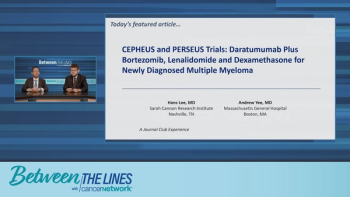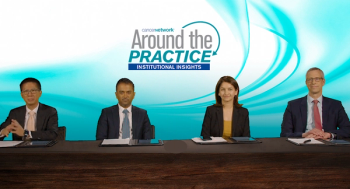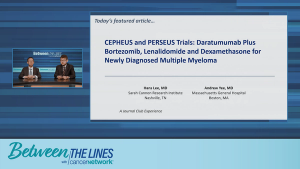
Panelists discuss how 4-drug regimens anchored by CD38 antibodies are becoming the standard of care in myeloma, with future directions focusing on integrating novel immunotherapies and potentially redefining the role of transplant.

Your AI-Trained Oncology Knowledge Connection!


Panelists discuss how 4-drug regimens anchored by CD38 antibodies are becoming the standard of care in myeloma, with future directions focusing on integrating novel immunotherapies and potentially redefining the role of transplant.

Panelists discuss that Dara-VRD offers significant benefits in sustained minimal residual disease (MRD) negativity and progression-free survival with a manageable safety profile, emphasizing dose adjustments and supportive care to balance efficacy and toxicity in frontline multiple myeloma treatment.

Panelists discuss recent data showing that sustained minimal residual disease (MRD) negativity strongly predicts long-term progression-free survival (PFS) in multiple myeloma, regardless of whether patients receive a 4-drug daratumumab-based regimen or standard-drug therapy, emphasizing MRD negativity as a key surrogate end point; they also highlight challenges in predicting who benefits most from intensive therapy and the importance of individualized dosing strategies to balance efficacy and tolerability across different patient populations.

Panelists discuss updated American Society of Clinical Oncology (ASCO) data confirming that daratumumab-based quadruplet therapy (Dara-VRD) significantly improves progression-free survival (PFS) and sustains minimal residual disease (MRD) negativity in patients with newly diagnosed transplant-eligible multiple myeloma, reducing early relapses and reinforcing this regimen as the evolving standard of care with potential for unprecedented long-term outcomes.

Panelists discuss the Perseus study, which compared daratumumab-based quadruplet therapy (Dara-VRD) with VRD alone in patients with newly diagnosed, transplant-eligible multiple myeloma, highlighting its focus on a generally fit population and demonstrating improved progression-free survival and deeper responses with the 4-drug regimen, while noting some limitations in applicability to patients with significant comorbidities.

Panelists discuss the adoption of 4-drug regimens—including a CD38 monoclonal antibody—as the standard frontline therapy for patients with transplant-eligible multiple myeloma, emphasizing tailored modifications based on age and frailty, and evolving maintenance strategies that incorporate daratumumab to deepen and sustain responses post-transplant.

Panelists discuss the manageable safety profile of 4-drug regimens in patients with transplant-eligible multiple myeloma, highlighting dose modifications such as weekly bortezomib and dexamethasone tapering to reduce adverse effects, alongside vigilant infection monitoring to optimize tolerability and quality of life.

Panelists discuss updated American Society of Clinical Oncology (ASCO) data showing that 4-drug regimens significantly improve outcomes even in patients with transplant-ineligible multiple myeloma, with real-world dose modifications enabling broader use while maintaining efficacy and tolerability.

Panelists discuss updated American Society of Clinical Oncology (ASCO) data showing that adding a CD38 monoclonal antibody to frontline triplet therapy improves minimal residual disease (MRD) negativity and progression-free survival in standard and intermediate-risk multiple myeloma, while reinforcing the need for tailored strategies in high-risk patients.

Panelists discuss how recent data support the use of quadruplet regimens—including anti-CD38 antibodies—even in older or moderately frail patients with newly diagnosed multiple myeloma, shifting treatment decisions from transplant eligibility to functional status and depth of response.

Panelists discuss how subcutaneous anti-CD38 monoclonal antibodies are reshaping frontline multiple myeloma treatment by improving efficacy, tolerability, and patient convenience across both transplant-eligible and ineligible populations.

Closing out their discussion on relapsed/refractory multiple myeloma, experts consider adverse event management in patients receiving bispecifics followed by future directions in care.

Comprehensive perspectives on the role of bispecific antibodies in the treatment of relapsed/refractory multiple myeloma.

A brief review of the use of CAR T-cell therapy in patients with relapsed/refractory multiple myeloma.

Moving to the last patient profile, expert panelists discuss a patient with triple-class refractory multiple myeloma managed with BCMA-targeting bispecific therapy.

Shared insight on the selection of therapy for patients with transplant-ineligible, newly diagnosed multiple myeloma and high-risk cytogenetics.

Expert panelists consider which regimen they would use, and for what duration, in the setting of transplant-ineligible, newly diagnosed multiple myeloma.

The panel moves on to review the profile of a patient with transplant-ineligible, newly diagnosed multiple myeloma managed with dara-Rd on the MAIA trial.

Before closing their discussion on transplant-eligible, newly diagnosed multiple myeloma, experts consider duration of therapy in this setting.

Panelists briefly review factors they use to select induction therapy for patients with transplant-eligible, newly diagnosed multiple myeloma.

Shared insight on approved quadruplet vs triplet induction regimens for patients with transplant-eligible, newly diagnosed multiple myeloma, evaluated in the GRIFFIN, MASTER and GMMG-HD7 trials.

Experts discuss a patient with transplant-eligible, newly diagnosed multiple myeloma managed with induction daratumumab-RVd and maintenance therapy.

Published: July 19th 2022 | Updated:

Published: June 16th 2025 | Updated:

Published: July 6th 2022 | Updated:

Published: July 11th 2022 | Updated:

Published: July 11th 2022 | Updated:

Published: July 6th 2022 | Updated: